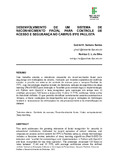Desenvolvimento de um Sistema de Reconhecimento Facial para Controle de Acesso e Segurança no Campus IFPE Paulista.
| dc.creator | Santos, Gabriel Henrique de Santana | |
| dc.date.accessioned | 2025-06-05T21:29:04Z | |
| dc.date.available | 2025-06-05T21:29:04Z | |
| dc.date.issued | 2025-05-28 | |
| dc.identifier.citation | SANTOS, Gabriel Henrique de Santana. Desenvolvimento de um sistema de reconhecimento facial para controle de acesso e segurança no Campus IFPE Paulista. 2025. Trabalho de Conclusão de Curso (Tecnologia em Análise e Desenvolvimento de Sistemas) — Instituto Federal de Educação, Ciência e Tecnologia de Pernambuco, Orientador: Rodrigo Cesar Lira da Silva, Campus Paulista, Paulista, 2025. | pt_BR |
| dc.identifier.uri | https://repositorio.ifpe.edu.br/xmlui/handle/123456789/1710 | |
| dc.description.abstract | This work addresses the growing relevance of facial recognition for security in educational institutions, motivated by recent episodes of school violence, and proposes an access control system for IFPE's Paulista campus, whose methodology includes a literature review, selection of deep learning algorithms (Res10-SSD for detection and FaceNet for embeddings), and implementation in Python with OpenCV and face_recognition for real-time operation. The prototype processed 120 faces at rates between 17.44 and 31 FPS, with average confidence above the defined threshold. This allowed it to correctly identify authorized users and intruders, although performance fluctuations under load and lighting variations reveal the need for optimizations in pre-processing and diversification of the dataset. | pt_BR |
| dc.format.extent | 19 p. | pt_BR |
| dc.language | pt_BR | pt_BR |
| dc.relation | BBC NEWS BRASIL. O que se sabe sobre o ataque a tiros que matou 14 pessoas em universidade em Praga. 22 dez. 2023. Disponível em: https://www.bbc.com/portuguese/articles/c2jy4z81j5lo. Acesso em: 19 jun. 2024. BRADSKI, G.; KAEHLER, A. Learning OpenCV: Computer vision with the OpenCV library. Sebastopol: O’Reilly Media, Inc, 2008. ISBN: 978-0-596-51613-0. FENG, Y. et al. Detect Faces Efficiently: A Survey and Evaluations. IEEE Transactions on Biometrics, Behavior, and Identity Science, v. 4, n. 1, p. 1–18, jan. 2022. Doi: 10.1109/TBIOM.2021.3120412. LI, L. et al. A Review of Face Recognition Technology. IEEE Access, v. 8, p. 139110–139120, 21 jul. 2020. LIU, W.; ANGUELOV, D.; ERHAN, D. et al. SSD: Single Shot MultiBox Detector. In: EUROPEAN CONFERENCE ON COMPUTER VISION (ECCV), 14. Amsterdam: Springer, Cham, 2016. p. 21-37. MAKHSUD, U. Identification and Authentication. International Journal Of Academic Pedagogical Research (IJAPR), p. 39, jan. 2021. ISSN: 2643-9123. MANDRU, SRIKANTH. How AI can improve identity verification and access control processes. Journal of Artificial Intelligence & Cloud Computing, v. 1, n. 4, p. 1-5, dez. 2022. OLOYEDE, M. O.; HANCKE, G. P.; MYBURGH, H. C. A review on face recognition systems: recent approaches and challenges. Multimedia Tools and Applications, v. 79, n. 37–38, p. 27891–27922, jul. 2020. SANTOSO, W.; SAFITRI, R.; SAMIDI, S. Integration of Artificial Intelligence in Facial Recognition Systems for Software Security. Sinkron: jurnal dan penelitian teknik informatika, v. 8, n. 2, p. 1208–1214, 30 abr. 2024. SCHROFF, F.; KALENICHENKO, D.; PHILBIN, J. FaceNet: A unified embedding for face recognition and clustering. In: 2015 IEEE Conference on Computer Vision and Pattern Recognition (CVPR), jun. 2015. TASKIRAN, M.; KAHRAMAN, N.; ERDEM, C. E. Face recognition: Past, present and future (a review). Digital Signal Processing, v. 106, p. 102809, nov. 2020. VINHA, TELMA, et al. Ataques de Violência Extrema em Escolas no Brasil: Causas e Caminhos. 1. ed. São Paulo: D3e, 2023. ISBN: 978-65-995856-8-5. VIOLA, P.; JONES, M. Rapid Object Detection using a Boosted Cascade of Simple Features. Conference on Computer Vision and Pattern Recognition, 2001. YUSUF, NUHU; MARAFA, Kamalu Abdullahi; SHEHU, Kamila Ladan; MAMMAN, Hussaini; MAIDAWA, Mustapha. A survey of biometric approaches of authentication. International Journal of Advanced Computer Research, v. 10, n. 47, p. 96–104, 2020. INSTITUTO FEDERAL DE EDUCAÇÃO, CIÊNCIA E TECNOLOGIA DE PERNAMBUCO. Campus Paulista. Curso de Análise e Desenvolvimento de Sistemas. 2025. ZHOU, F.; ZHAO, T. A survey on biometrics authentication. arXiv, 15 dez. 2022. ZULKARNAIN, S.; et al. A review on authentication methods. Australian Journal of Basic and Applied Sciences, v. 7, n. 7, p. 95–107, 2013. | pt_BR |
| dc.rights | Acesso Aberto | pt_BR |
| dc.rights | An error occurred on the license name. | * |
| dc.rights.uri | An error occurred getting the license - uri. | * |
| dc.subject | Controle de acesso | pt_BR |
| dc.subject | Reconhecimento facial | pt_BR |
| dc.subject | Visão computacional | pt_BR |
| dc.subject | Deep learning | pt_BR |
| dc.title | Desenvolvimento de um Sistema de Reconhecimento Facial para Controle de Acesso e Segurança no Campus IFPE Paulista. | pt_BR |
| dc.title.alternative | Development of a Facial Recognition System for Access Control and Security at IFPE Paulista Campus | pt_BR |
| dc.type | Article | pt_BR |
| dc.creator.Lattes | http://lattes.cnpq.br/9552977842271589 | pt_BR |
| dc.contributor.advisor1 | Silva, Rodrigo Cesar Lira da | |
| dc.contributor.advisor1Lattes | http://lattes.cnpq.br/2442224050349612 | pt_BR |
| dc.contributor.referee1 | Araújo, Jair Galvão | |
| dc.contributor.referee2 | Oliveira, Flávio Rosendo da Silva | |
| dc.contributor.referee1Lattes | http://lattes.cnpq.br/7275113695298926 | pt_BR |
| dc.contributor.referee2Lattes | http://lattes.cnpq.br/6828380394080049 | pt_BR |
| dc.publisher.department | Paulista | pt_BR |
| dc.publisher.country | Brasil | pt_BR |
| dc.subject.cnpq | CIENCIAS EXATAS E DA TERRA::CIENCIA DA COMPUTACAO::SISTEMAS DE COMPUTACAO | pt_BR |
| dc.description.resumo | Este trabalho aborda a relevância crescente do reconhecimento facial para segurança em instituições de ensino, motivado por recentes episódios de violência escolar, e propõe um sistema de controle de acesso para o Campus Paulista do IFPE, cuja metodologia engloba revisão de literatura, seleção de algoritmos de deep learning (Res10-SSD para detecção e FaceNet para embeddings) e implementação em Python com OpenCV e face_recognition para operação em tempo real. O protótipo processou 120 faces a taxas entre 17,44 e 31 FPS, com confiança média acima do threshold definido, o que permitiu identificar corretamente usuários autorizados e intrusos, embora oscilações de desempenho sob carga e variações de iluminação revelem a necessidade de otimizações no pré-processamento e de diversificação do dataset. | pt_BR |


